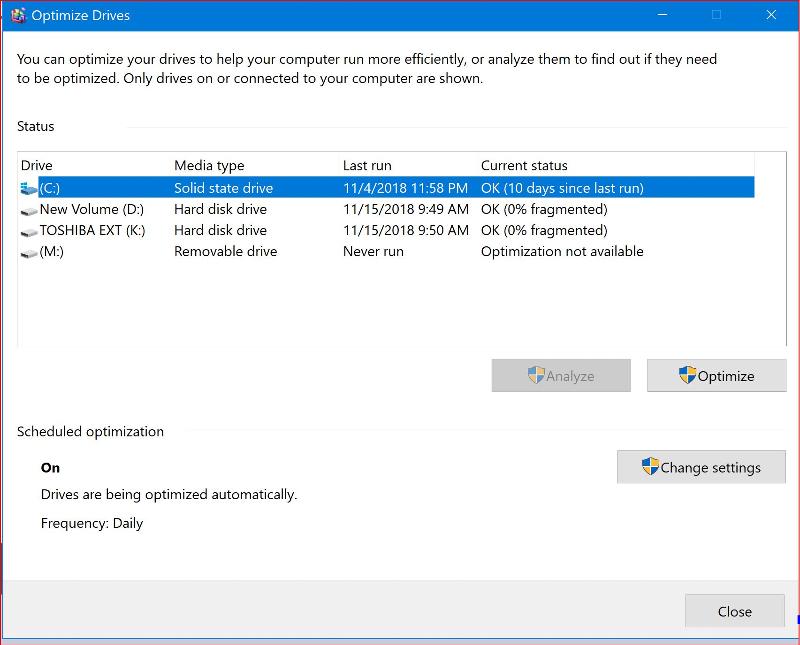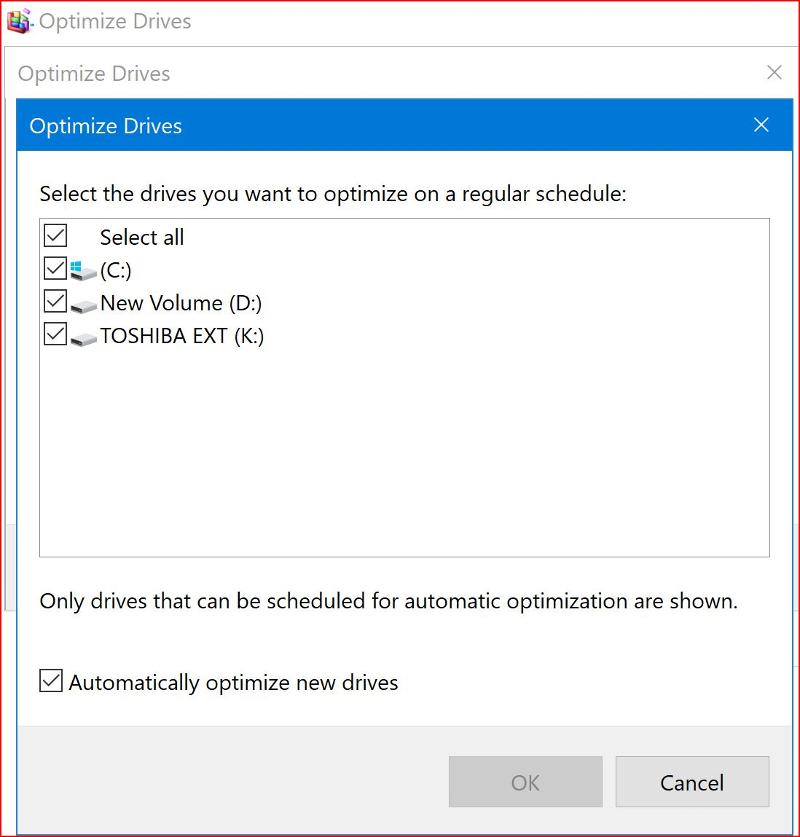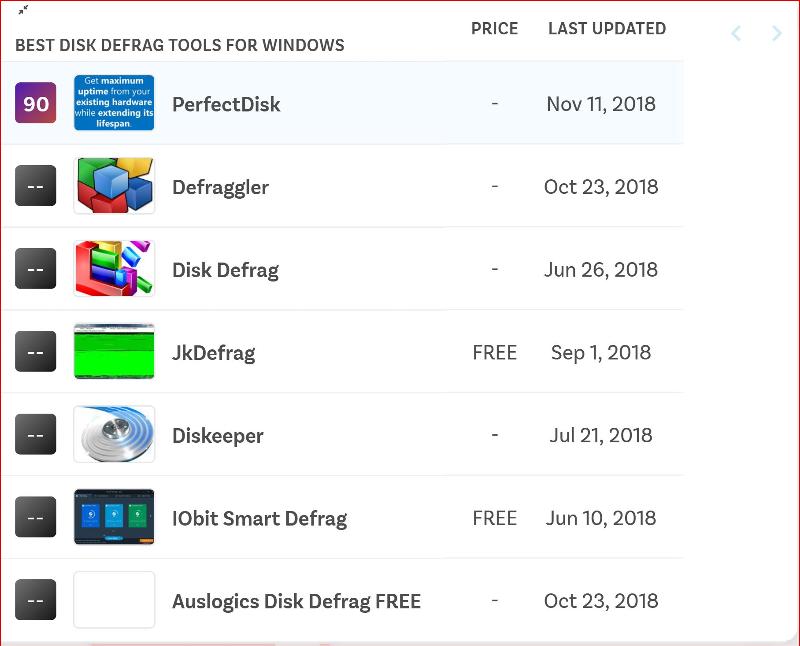Best Defragmentation Software
I would like know if the Disc Defragmenter that comes with windows 10 is it good enough to do the job or do I need to buy something else, a third party product like Defraggler(CCleaner) or Diskeeper. If I need to buy another product , please recommend something that is excellent in performance and easy to use. Thank you,
Basem Khawaja, R.Ph.
Basem Khawaja, R.Ph.
I haven't used defrag software in 15 years. And I wouldn't on any SSD.
The Windows disk defragmenter has run automatically once a week since Windows 7 and for most purposes that should be sufficient. On a system with an SSD this should be disabled.
Certainly on an SSD it is usually counterproductive to defragment the drive. Defragmenting an SSD unnecessarily uses up write cycles, of which there are only a limited number, and hastens the day when the drive will say "Due to wear leveling, every sector on me just became bad."
There are extreme cases such as many files with, say 3000 extents, where defragmenting an SSD might be considered. This is an arguable point, though -- is it better to reduce the number of extents by defragmenting the drive, or let Windows handle the extents internally at the cost of a small amount of memory and some overhead in file access? And it is an extreme case.
If you're in an environment where a drive continually requires defragmentation then prophylactic measures should be deployed instead. These include setting the drive cluster size fairly large, preallocating large files best-try-contiguous rather than sparse, and (when an extend is required) allocating big chunks rather than one record at a time.
You will get varying opinions on this, but I consider CCleaner the equivalent of handing a child a loaded shotgun with a hair trigger and saying "Don't play with the pretty settings to see what happens." You know what's going to happen eventually. It is best to never install it -- then there is no temptation to get in trouble by using it.
Certainly on an SSD it is usually counterproductive to defragment the drive. Defragmenting an SSD unnecessarily uses up write cycles, of which there are only a limited number, and hastens the day when the drive will say "Due to wear leveling, every sector on me just became bad."
There are extreme cases such as many files with, say 3000 extents, where defragmenting an SSD might be considered. This is an arguable point, though -- is it better to reduce the number of extents by defragmenting the drive, or let Windows handle the extents internally at the cost of a small amount of memory and some overhead in file access? And it is an extreme case.
If you're in an environment where a drive continually requires defragmentation then prophylactic measures should be deployed instead. These include setting the drive cluster size fairly large, preallocating large files best-try-contiguous rather than sparse, and (when an extend is required) allocating big chunks rather than one record at a time.
You will get varying opinions on this, but I consider CCleaner the equivalent of handing a child a loaded shotgun with a hair trigger and saying "Don't play with the pretty settings to see what happens." You know what's going to happen eventually. It is best to never install it -- then there is no temptation to get in trouble by using it.
Hi Basem,
I once did a comparison back when I was running Windows 7 by imaging a fragmented drive, running Windows defragmentation tool on it and noting the results. I then restored the drive back to its fragmented state and ran third party defragmentation tools.
The improvements in some were so minor that it wasn't worth changing. I tried several products too, including Defraggler that you mentioned, as well as about 3 or 4 other commercial products that slip my mind at the moment, though I could look it up in my history of notes if you really wanted to know which ones I tested. A couple did a slightly better job (defragmenting better by about 2 to 3 percent, but that's really not worth the trouble of buying and using the tool.
NONE of the ones I tested defragmented to 0% fragmentation with only 1 run either. They ALL needed a second run to get a drive defragmented to 0%
With that said, ensure you don't defrag an SSD drive as others have already stated above. Only use it on mechanical drives which I'm fairly sure you have from previous questions. Windows 10 should automatically disable Defragmentation on any drive it detects as an SSD anyway, but it always pays to check if you have an SSD drive installed.
Don't waste your time and money is my opinion and that's a result of my tests that I mentioned earlier. Just stick with Microsoft 10's built-in Defrag tool. It does as good a job as any of the other commercial ones I tested.
I hope that's helpful.
Regards, Andrew
I would like know if the Disc Defragmenter that comes with windows 10 is it good enough to do the job or do I need to buy something else, a third party product like Defraggler(CCleaner) or Diskeeper.In so far as doing a good job, it's a waste of money (in my opinion) to purchase or use different defragmentation tools.
I once did a comparison back when I was running Windows 7 by imaging a fragmented drive, running Windows defragmentation tool on it and noting the results. I then restored the drive back to its fragmented state and ran third party defragmentation tools.
The improvements in some were so minor that it wasn't worth changing. I tried several products too, including Defraggler that you mentioned, as well as about 3 or 4 other commercial products that slip my mind at the moment, though I could look it up in my history of notes if you really wanted to know which ones I tested. A couple did a slightly better job (defragmenting better by about 2 to 3 percent, but that's really not worth the trouble of buying and using the tool.
NONE of the ones I tested defragmented to 0% fragmentation with only 1 run either. They ALL needed a second run to get a drive defragmented to 0%
With that said, ensure you don't defrag an SSD drive as others have already stated above. Only use it on mechanical drives which I'm fairly sure you have from previous questions. Windows 10 should automatically disable Defragmentation on any drive it detects as an SSD anyway, but it always pays to check if you have an SSD drive installed.
If I need to buy another product , please recommend something that is excellent in performance and easy to use. Thank you,
Don't waste your time and money is my opinion and that's a result of my tests that I mentioned earlier. Just stick with Microsoft 10's built-in Defrag tool. It does as good a job as any of the other commercial ones I tested.
I hope that's helpful.
Regards, Andrew
@Dr. Klahn
We seem to differ on that opinion. I've had Ccleaner fix registry problems and do it quite safely so long as the default settings are not messed around with.
I always warn people I recommend that tool to NOT to use it to repair the registry unless there is a specific need to. I personally have licensed Business Versions of all of Piriform's tools and in the right hands, they do a great job and can save a LOT of troubleshooting and repair time.
Even for newbs, using the Cleaning option of Ccleaner to clean the disk of Temp files - not registry) does a fantastic job and is often much better to use than Windows built-in Clean up tool. I use it myself and have never had any ill effects. It's also free to use for personal use.
Regards, Andrew
You will get varying opinions on this, but I consider CCleaner the equivalent of handing a child a loaded shotgun with a hair trigger and saying "Don't play with the pretty settings to see what happens." You know what's going to happen eventually. It is best to never install it -- then there is no temptation to get in trouble by using it.
We seem to differ on that opinion. I've had Ccleaner fix registry problems and do it quite safely so long as the default settings are not messed around with.
I always warn people I recommend that tool to NOT to use it to repair the registry unless there is a specific need to. I personally have licensed Business Versions of all of Piriform's tools and in the right hands, they do a great job and can save a LOT of troubleshooting and repair time.
Even for newbs, using the Cleaning option of Ccleaner to clean the disk of Temp files - not registry) does a fantastic job and is often much better to use than Windows built-in Clean up tool. I use it myself and have never had any ill effects. It's also free to use for personal use.
Regards, Andrew
I have 3 machines all Windows 10.
One machine has a future release of Windows 10, hard drive, and no other defrag tool. Works fast and well. No fragmentation to speak of.
One machine is my Laptop with SSD and Windows Disk Defrag does not run (by design as noted above). TRIM runs occasionally. This machine has Windows 10 V1809.
One machine is my Desktop with hard drives and Raxco Perfect disk because I had the license. No performance difference one way or the other compared to the first machine with hard drive and Windows Defrag. This machine is Windows 10 V1809 as well.
This very much supports the position agreed with above that there is no need at all to purchase a third party defrag tool.
Perfect Disk is the best of the third party tools. But still not needed.
One machine has a future release of Windows 10, hard drive, and no other defrag tool. Works fast and well. No fragmentation to speak of.
One machine is my Laptop with SSD and Windows Disk Defrag does not run (by design as noted above). TRIM runs occasionally. This machine has Windows 10 V1809.
One machine is my Desktop with hard drives and Raxco Perfect disk because I had the license. No performance difference one way or the other compared to the first machine with hard drive and Windows Defrag. This machine is Windows 10 V1809 as well.
This very much supports the position agreed with above that there is no need at all to purchase a third party defrag tool.
Perfect Disk is the best of the third party tools. But still not needed.
ASKER
I have some questions to ask after reading the above replies. Why does Microsoft allow the SSD to be DEFRAGMENTED if it does NOT need to based on every expert's response here? Was I causing any unnecessary harm to my PC since it was being defragmented all along? Why are there all these software companies promoting their products beside the obvious to make money if their products do not provide that much significant difference versus Microsoft built in defragmentation tool? Finally I have included a chart of the 7 best defrag tools comparison chart and it shows that Disc Defrag by Microsoft ranked third. So am I still good with Disc Defrag given this information? The chart link is the following:
https://www.slant.co/topics/841/~best-disk-defrag-tools-for-windows



https://www.slant.co/topics/841/~best-disk-defrag-tools-for-windows
Why does Microsoft allow the SSD to be DEFRAGMENTED if it does NOT need to based on every expert's response here?Either it didn't detect your drive as an SSD or when your computer was upgraded to Windows 10, then whoever did the upgrade for you could have turned optimizing on for your C: drive by mistake. Microsoft Windows 10 knows it's not needed for SSD drives, but it allows you to override that decision if you want to.
In any case, your C: drive should definitely NOT be defragmented as it is an SSD drive - doing so does nothing to increase the speed of the system and only serves to shorten the lifespan of the drive.
Turn Optimizing OFF by removing the tick (un-tick it) from the C: drive as per your second image.
Was I causing any unnecessary harm to my PC since it was being defragmented all along?In a sense, yes you were because it just decreases the lifespan of the SSD drive so it will fail sooner than later eventually.
Why are there all these software companies promoting their products beside the obvious to make money if their products do not provide that much significant difference versus Microsoft built in defragmentation tool?Because they rely on people who don't know any better to fall for their advertising and buy their product anyway. You were smart enough to ask a question here to get expert opinions. Others are not so smart and just believe everything they read on the Internet. That's how these companies make their money.
Finally I have included a chart of the 7 best defrag tools comparison chart and it shows that Disc Defrag by Microsoft ranked third. So am I still good with Disc Defrag given this information? The chart link is the following:Yes! Despite that information, the differences will be minor. I would *strongly* recommend you just stick with Microsoft's Defrag. BUT, turn it OFF for your SSD Drive - it is not necessary to defragment SSD drives and doing so only harms them by shortening their lifespan.
I hope that's helpful.
Regards, Andrew
Just further to my answer above, I would also recommend you take the tick OFF the setting in your second image that states: "Automatically optimize new drives" because if you leave that tick on, and install another SSD drive in the future, then it will be added to be automatically optimized.
Better to also have that tick off and then manually add any new hard drive you may have installed in the future to be automatically optimized if it is a mechanical drive, rather than a Solid State Drive. (SSD)
Regards, Andrew
Better to also have that tick off and then manually add any new hard drive you may have installed in the future to be automatically optimized if it is a mechanical drive, rather than a Solid State Drive. (SSD)
Regards, Andrew
ASKER
Andrew
You are a genius and an honest man my friend. I did what you suggested . I unchecked the tick selection from the c drive SSD and from optimize new drive, However, I am still able to see the C Drive and can highlight it and able to click optimize. Analyze is greyed out. Why is that?
You are a genius and an honest man my friend. I did what you suggested . I unchecked the tick selection from the c drive SSD and from optimize new drive, However, I am still able to see the C Drive and can highlight it and able to click optimize. Analyze is greyed out. Why is that?
ASKER CERTIFIED SOLUTION
membership
This solution is only available to members.
To access this solution, you must be a member of Experts Exchange.
ASKER
Thank you all.
ASKER
Thank you all.
You're very welcome Basem. Glad I was able to assist :)
Regards, Andrew
Regards, Andrew